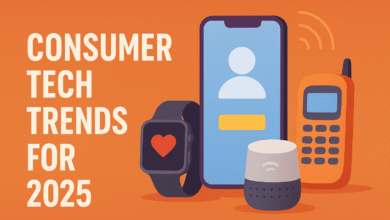The Expanding Universe of AI Careers: New Skills for a New Era

▼ Summary
– The rapid advancement of AI is reshaping the workforce, creating specialized roles beyond traditional engineering and data science, requiring diverse expertise for AI development, deployment, and governance.
– Key established AI roles include AI Developer, Data Scientist, ML Engineer, Data Engineer, and AI Architect, with emerging roles like AI Product Manager, UX Designer, and AI Ethicist focusing on leadership, user-centric design, and ethical considerations.
– New roles such as Prompt Engineer and AI Ethicist address challenges in generative AI and ethical AI development, ensuring systems are fair, transparent, and aligned with societal values.
– AI agents are increasingly automating tasks in customer service, data processing, HR, finance, and more, raising concerns about job displacement but also creating opportunities for new job creation and efficiency gains.
– Successful AI implementation requires collaboration across various roles throughout the AI lifecycle, emphasizing the need for technical, business, ethical, and governance expertise to manage AI’s complexity and impact responsibly.
The rapid advance of artificial intelligence, fueled by sophisticated algorithms and vast datasets, extends its influence far beyond the purely technical field, fundamentally reshaping the human workforce and creating new avenues for specialized skills and critical oversight. As AI systems become more complex and integrated into our daily lives and business operations, a spectrum of specialized roles is emerging. These roles demand a diverse range of expertise to navigate the development, deployment, and governance of this transformative technology, moving beyond the foundational engineering and data science positions.
The visual of new AI roles circulating on professional networks paints a clear picture: the AI ecosystem is maturing. It’s no longer a field solely occupied by a handful of technical specialists. Instead, we’re observing a growing necessity for individuals who can build, manage, govern, and critically examine AI from multiple perspectives. This evolution signifies a crucial step towards responsible and effective AI adoption.
Core Pillars and New Frontiers: Must-Haves and Emerging Specializations
The “must-have” AI roles, as highlighted, represent the bedrock of any AI initiative. These include the AI Developer, Data Scientist, ML Engineer, Data Engineer, and AI Architect. These professionals are responsible for the design, construction, and maintenance of AI systems. Alongside them, roles like AI Product Manager, UX Designer (specializing in AI interactions), and Head of AI underscore the importance of strategic leadership and user-centric design in deploying successful AI solutions. The D&A & AI Translator (Data & Analytics and AI Translator) fills a vital communication gap, ensuring business needs align with technical capabilities.

Beyond these established functions, a fascinating array of “emerging AI roles” is taking shape. These new specializations address the nuanced challenges and opportunities presented by advanced AI.
Consider the Prompt Engineer, a role that gained prominence with the rise of generative AI. These individuals specialize in crafting and refining the inputs given to AI models to achieve desired outputs, a skill that blends technical understanding with creative communication. While some reports suggest a potential plateauing in demand for standalone prompt engineers as AI models become more intuitive, the underlying skill of effectively interacting with and guiding AI remains valuable, possibly becoming integrated into other roles.
- The AI Ethicist is another critical emerging role, tasked with navigating the complex moral landscape of artificial intelligence. Their responsibilities include ensuring AI systems are fair, transparent, accountable, and align with societal values and human rights. They work to identify and mitigate biases, establish standards for responsible AI development, and ensure compliance with evolving regulations.
- AI Risk & Governance Specialists focus on establishing frameworks and policies to manage the potential downsides of AI, from privacy violations to security threats. They work closely with legal and technical teams to ensure AI initiatives are compliant and ethically sound.
- Knowledge Engineers are vital in building systems that emulate human expertise. They translate human knowledge into formats that AI can understand and use, often working to create expert systems for specialized domains like healthcare or finance. This involves not just technical skill but also strong communication and an understanding of human behavior and the specific field of expertise.
- Other noteworthy emerging roles include the Model Validator, who ensures AI models perform accurately and reliably before deployment and throughout their lifecycle, and the Decision Engineer, who likely focuses on designing and implementing AI systems that support and automate complex decision-making processes. The Analytics Engineer serves as a bridge, transforming raw data into clean, accessible formats for analysis and empowering end-users to derive insights. They apply software engineering best practices to analytics, focusing on data modeling, transformation, testing, and documentation.

The Other Side of the Coin: AI Agents and Task Automation
While new human-centric roles are blossoming, it’s also important to acknowledge the parallel development of sophisticated AI agents—software programs designed to perceive their environment, make decisions, and act autonomously to achieve specific goals. These AI agents are increasingly capable of performing a wide range of tasks that traditionally required human intervention.
Across industries, AI agents are being deployed for functions such as:
- Customer Service: Handling routine queries, providing support through chatbots, and even anticipating customer needs.
- Data Entry and Processing: Automating the input, validation, and generation of reports.
- Administrative Support: Managing schedules, organizing emails, and handling other repetitive clerical tasks.
- HR and Recruitment: Assisting with candidate screening, onboarding new employees, and managing leave requests.
- Finance and Accounting: Automating invoice processing, expense management, and aspects of financial analysis.
- Supply Chain and Inventory Management: Optimizing stock levels, tracking shipments, and predicting demand.
- IT Operations: Automating help desk functions, monitoring system performance, and assisting with code reviews.
- Marketing: Personalizing campaigns, analyzing market trends, and assisting with content creation.
This automation can lead to significant efficiency gains and allow human employees to focus on more complex, strategic, and creative endeavors. However, it also prompts discussions about job displacement. Some analyses, like a 2023 McKinsey report, suggest that a significant percentage of employee workloads could be automated with technologies like generative AI. The World Economic Forum has also projected both job displacement and creation due to AI, with clerical and administrative roles among the fastest declining.
The impact isn’t uniform. While some tasks and roles, particularly those that are predictable and rule-based, face a higher likelihood of automation, AI is also viewed as a catalyst for new job creation. Gartner, for example, predicts that AI-related job creation will ultimately outpace job losses, though a transition period is anticipated. Many significant innovations in the past have followed a similar pattern of temporary job loss followed by recovery and business transformation. The focus is shifting towards a workforce that can collaborate with AI, leveraging its strengths while human expertise guides, oversees, and innovates.

AI Roles Across the Lifecycle: A Collaborative Ecosystem
The lower portion of the visual aptly illustrates how these diverse human roles fit into the typical AI lifecycle. This isn’t a linear process but an iterative loop requiring constant collaboration:
- Business Understanding & Data Preparation: This initial phase involves Business Experts, Data Engineers, and Data Scientists working together to define problems, identify relevant data sources, and prepare data for modeling. Analytics Engineers also play a crucial role here in making data ready for analysis.
- Model Development & Validation: AI Experts and Model Developers (often ML Engineers or AI Engineers) take the lead in creating and training models. Model Validators then step in to rigorously test these models for accuracy, fairness, and robustness against unseen data. Business Owners are also involved in validating that the model meets business objectives.
- Operations, Activation & Deployment: Once validated, AI Architects and Model/ML(Ops) Engineers manage the deployment and scaling of AI models into production environments. AI Monitoring ensures models continue to perform as expected over time.
- Integration & Testing: Software Engineers and Prompt Engineers (where applicable) ensure seamless integration with existing systems and conduct further testing. Model Validators continue their oversight here.
This lifecycle highlights that successful AI implementation is a team sport, requiring a blend of technical, business, and increasingly, ethical and governance expertise – especially as AI agents become more prevalent.
The Driving Forces: Complexity, Ethics, and Specialization
The abundance of these new human AI roles is driven by several factors. The increasing complexity of AI systems necessitates deeper specialization. As AI moves from experimental phases to critical business applications, and as AI agents take on more operational tasks, the need for robust human governance, risk management, and ethical oversight becomes paramount. Furthermore, the pure power and potential impact of AI demand professionals dedicated to ensuring its responsible and beneficial use, alongside managing its automated counterparts.
The journey of AI is undeniably reshaping the job market. It presents a dual narrative: the creation of a new cadre of human professionals equipped to build, manage, and ethically guide AI, and the rise of AI agents capable of automating a growing number of tasks. Effectively adapting to these profound shifts necessitates a commitment to continuous learning, a proactive approach to acquiring new skills, and a strategic focus on cultivating the uniquely human attributes that work in concert with artificial intelligence.




